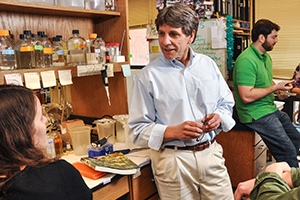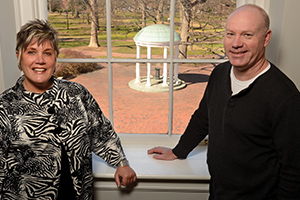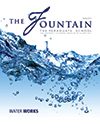The Big Picture
Collaborative Culture Thrives at Carolina
"Water is one of today's most important challenges," Graduate School Dean Steve Matson says, "and thoughtful, effective solutions won't come from any one discipline alone."

Graduate School Dean Steve Matson
Having been a researcher and faculty member for 30 years, Matson understands the importance of collaborative research. He credits the quality and interdisciplinary teamwork of faculty and graduate students for the success of research and graduate education at the University of North Carolina at Chapel Hill.
While incorporating the knowledge and approaches of different disciplines can result in optimal problem solutions, collective work also holds its own challenges. Learning how to work collaboratively and contribute effectively to a team project is a critical skill that Matson stresses for graduate students. "This open-mindedness and cooperative skill set will help our students have a stronger impact throughout their careers," Matson says.
The Graduate School encourages interdisciplinary work through fellowships like the Royster Society of Fellows and the Weiss Urban Livability fellowships. Students from different fields host and participate in seminars from a variety of disciplinary perspectives to expand their thinking and learn from other areas of study. The Royster Society and Weiss Program have both sponsored events on water-related issues during the 2012-2013 academic year, and the fellows themselves have taken the lead in planning these events.
Matson says the goal of The Graduate School is to ensure students are involved and trained in the most cutting-edge research techniques so they can follow their curiosity and stimulate new thought. One of the most important assets to research, he says, is learning from other students to gain otherwise unrealized insights.
Matson sees UNC-Chapel Hill as a place to analyze and confront huge global issues such as energy, disease, poverty and political civility. "Not only do our graduate students go on to do incredible things once they graduate, these students are doing incredible things while they're here."
Students can do their best work if they are personally and financially supported, according to Matson. That support is what enables graduate students to focus on their work and advance knowledge as a whole.
"The most precious thing we can give our graduate students is time—time to think, time to explore and time to do their best work," Matson says. That message resonates within the larger community that supports these students: the faculty, staff and friends of graduate education. "Graduate students at Carolina are taking on the world's key problems, and their impact is evident locally, nationally and globally."
♦ Cindy J. Austin
Theme Calls Campus to Action
Brilliant minds populate the University of North Carolina at Chapel Hill. What could they achieve when an innovative educational initiative brings them together?

Terry Rhodes (left) and Jamie Bartram
Water in Our World is Carolina's pan-campus theme, inviting individuals across disciplines to discuss, celebrate and research the planet's most valuable resource. It's not only the first time that UNC-Chapel Hill has introduced a two-year theme to the campus community—it's the first time any university has incorporated a theme to this extent. This level of commitment also demonstrates the university's consideration of water issues now and in the future.
"Major international players are saying that water is the defining challenge of the 21st century," says Jamie Bartram, co-chair of the theme's steering committee, professor in the Gillings School of Global Public Health, and director of the Water Institute at UNC-Chapel Hill. "And this university is positioning itself at the forefront—across vastly different domains—of this rising issue."
Water in Our World evolved from the 2011 academic strategic plan, which called for a theme to connect the campus over a common concern. "Water is a topic that enables the Carolina community to put their heads together and think about it from different angles," explains Terry Rhodes, co-chair of the steering committee and Senior Associate Dean for Fine Arts & Humanities. "Everyone brings different perspectives to the table, which has heightened and enriched the conversation."
The reaction to Water in Our World has been exceptional. "We've seen a response from just about every corner of campus," Bartram says. Tar Heels have participated in varied ways. For example, students led a plan to post engaging and humorous signage about water conservation in every residence hall.
Another development was the Water In Our World course, open to undergraduate and graduate students. The course invited varied leaders in water-related scholarship to teach a seminar one week. The following week, the students engaged in a discussion about the topic. A true success, the course will be offered next year and will include guests like Thomas Otten, a member of the music faculty, who will discuss the influence of water on Debussy's piano music.
The theme's second year will also engage more members of the Chapel Hill community, both on campus and surrounding it. In order to incorporate the theme into their programing, organizations like PlayMakers Repertory Company, Carolina Performing Arts, and Morehead Planetarium and Science Center needed the planning time that this two-year schedule facilitated. "The second year is going to be even richer with its schedule of cultural and scholarly events," Rhodes says. "We're hearing about new Water in Our World initiatives daily. There's a lot of momentum."
Carolina is uniquely capable of fostering this momentum. "We have an incomparable culture of collegiality here," Bartram says. "For people to come together across disciplines, you need an environment that fosters that. That's the culture we have at UNC."
♦ Laura Lacy
Photos by Will Owens


